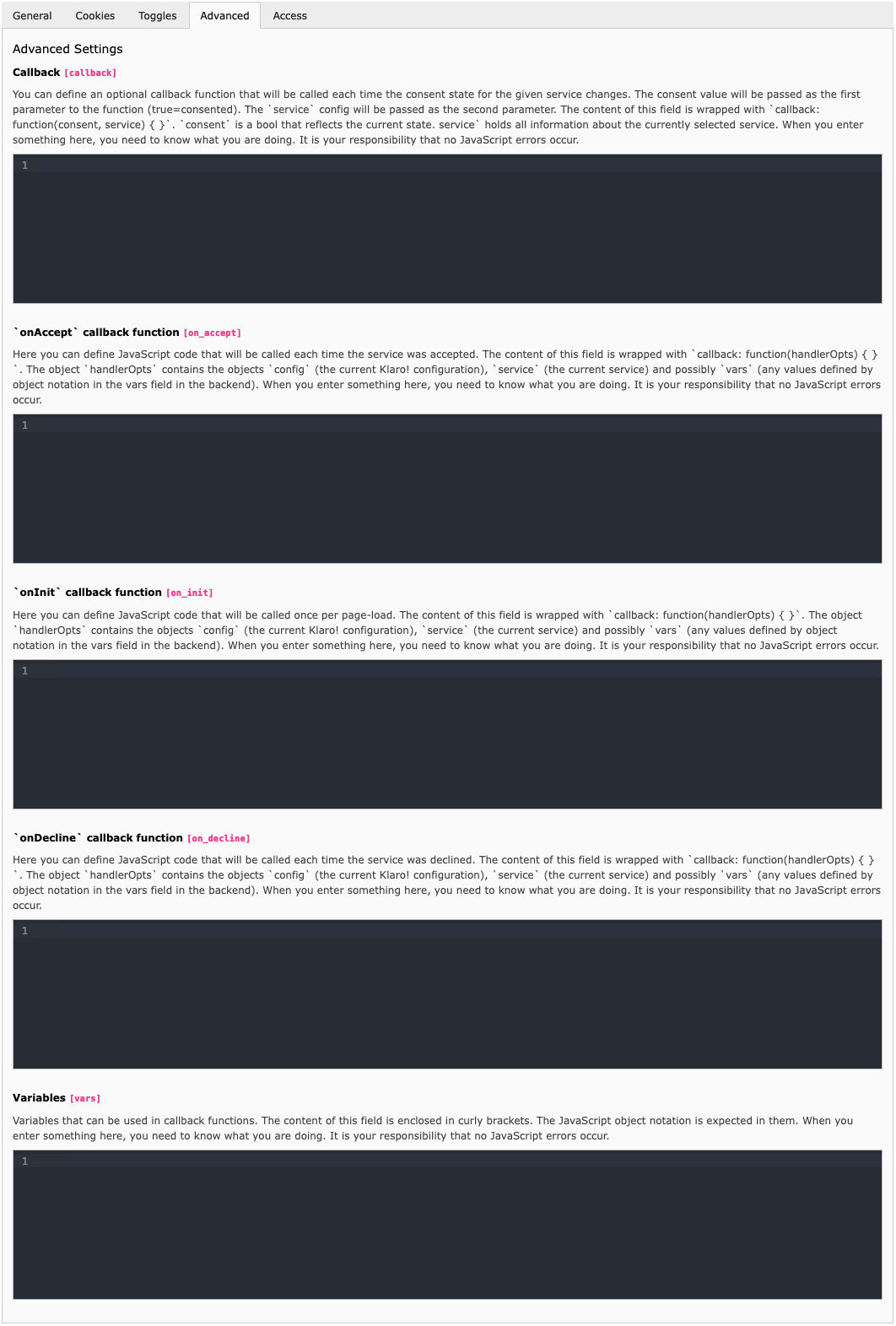Advanced

Service Configuration - Advanced Tab
Advanced Settings
Callback
callback
-
- type
-
string
- Default
-
''
You can define an optional callback function that will be called each time the consent state for the given service changes. The consent value will be passed as the first parameter to the function (true=consented). The
serviceconfig will be passed as the second parameter. The content of this field is wrapped withcallback: function.(consent, service) { } consentis a bool that reflects the current state. service` holds all information about the currently selected service. When you enter something here, you need to know what you are doing. It is your responsibility that no JavaScript errors occur.
onAccept callback function
on_accept
-
- type
-
string
- Default
-
''
Here you can define JavaScript code that will be called each time the service was accepted. The content of this field is wrapped with
callback: function. The object(handler Opts) { } handlercontains the objectsOpts config(the current Klaro! configuration),service(the current service) and possiblyvars(any values defined by object notation in the vars field in the backend). When you enter something here, you need to know what you are doing. It is your responsibility that no JavaScript errors occur.Example: Google Tag Manager// we notify the tag manager about all services that were accepted. You can define // a custom event in GTM to load the service if consent was given. for(let k of Object.keys(handlerOpts.consents)){ if (handlerOpts.consents[k]){ let eventName = 'klaro-'+k+'-accepted' dataLayer.push({'event': eventName}) } }Copied!Example: Google Analytics// we grant analytics storage gtag('consent', 'update', { 'analytics_storage': 'granted', })Copied!Example: Google Ads// we grant ad storage and personalization gtag('consent', 'update', { 'ad_storage': 'granted', 'ad_user_data': 'granted', 'ad_personalization': 'granted' })Copied!
onInit callback function
on_init
-
- type
-
string
- Default
-
''
Here you can define JavaScript code that will be called once per page-load. The content of this field is wrapped with
callback: function. The object(handler Opts) { } handlercontains the objectsOpts config(the current Klaro! configuration),service(the current service) and possiblyvars(any values defined by object notation in the vars field in the backend). When you enter something here, you need to know what you are doing. It is your responsibility that no JavaScript errors occur.Example: Google Tag Manager// initialization code here (will be executed only once per page-load) window.dataLayer = window.dataLayer || []; window.gtag = function(){dataLayer.push(arguments)} gtag('consent', 'default', {'ad_storage': 'denied', 'analytics_storage': 'denied', 'ad_user_data': 'denied', 'ad_personalization': 'denied'}) gtag('set', 'ads_data_redaction', true)Copied!
onDecline callback function
on_decline
-
- type
-
string
- Default
-
''
Here you can define JavaScript code that will be called each time the service was declined. The content of this field is wrapped with
callback: function. The object(handler Opts) { } handlercontains the objectsOpts config(the current Klaro! configuration),service(the current service) and possiblyvars(any values defined by object notation in the vars field in the backend). When you enter something here, you need to know what you are doing. It is your responsibility that no JavaScript errors occur.Example: Google Analytics// we deny analytics storage gtag('consent', 'update', { 'analytics_storage': 'denied', })Copied!Example: Google Ads// we decline ad storage and personalization gtag('consent', 'update', { 'ad_storage': 'denied', 'ad_user_data': 'denied', 'ad_personalization': 'denied' })Copied!
Variables
vars
-
- type
-
string
- Default
-
''
Variables that can be used in callback functions. The content of this field is enclosed in curly brackets. The JavaScript object notation is expected in them. When you enter something here, you need to know what you are doing. It is your responsibility that no JavaScript errors occur.
